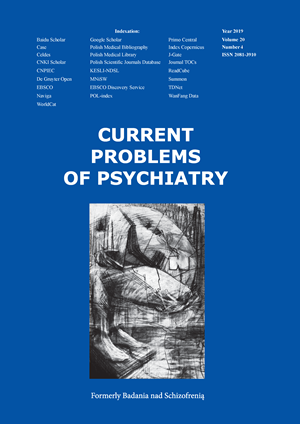Zespół policystycznych jajników a zaburzenia psychiczne – omówienie rekomendacji European Society of Human Reproduction and Embryology (ESHRE)
DOI:
https://doi.org/10.2478/cpp-2019-0018Słowa kluczowe:
zespół policystycznych jajników, zaburzenia psychiczne, rekomendacjeAbstrakt
Wstęp: Zespół policystycznych jajników (PCOS) jest najczęstszą endokrynopatią występującą u kobiet w wieku rozrodczym. W 2018 roku Europejskie Towarzystwo Rozrodu Człowieka i Embriologii (ESHRE) opracowało wytyczne dotyczące diagnostyki i leczenia kobiet z PCOS. W rekomendacjach tych osobny rozdział poświęcono zaburzeniom psychicznym towarzyszącym zespołowi policystycznych jajników.
Materiał i Metodyka: W pracy zawarto przegląd literatury dotyczącej zaburzeń psychicznych u kobiet z PCOS, ze szczególnym uwzględnieniem rekomendacji ESHRE.
Wnioski: Zarówno personel medyczny, jak i pacjentki, powinni być świadomi negatywnego wpływu zespołu policystycznych jajników na jakość życia oraz na współistnienie depresji, lęku, zaburzeń psychoseksualnych i odżywiania.
Bibliografia
1. Rotterdam ESHRE/ASRM-Sponsored PCOS Consensus Workshop Group. Revised 2003 consensus on diagnostic criteria and long-term health risk related to polycystic ovary syndrome. Fertil. Steril. 2004; 81 (1): 19-25. https://doi.org/10.1016/j.fertnstert.2003.10.004
2. National Institutes of Health Evidence-based methodology workshop on polycystic ovary syndrome, December 3-5, 2012. Executive summary. https://prevention.nih.gov/docs/ programs/pcos/FinalReport.pdf.
3. Fauser BC, Tarlatzis BC, Rebar RW, Legro RS, Balen AH, Lobo R, et al. Consensus on women's health aspects of polycystic ovary syndrome (PCOS): the Amsterdam ESHRE/ASRM-Sponsored 3rd PCOS Consensus Workshop Group. Fertil. Steril. 2012; 97 (1): 28-38.e25 https://doi.org/10.1016/j.fertnstert.2011.09.024
4. Teede HJ, Misso ML, Costello MF, Dokras A, Laven J, Moran L, et al. International PCOS Network. Recommendations from the international evidence-based guideline for the assessment and management of polycystic ovary syndrome. Hum. Reprod. 2018; 33 (9): 1602-1618.
5. Hollinrake, E., Abreu A, Maifeld M, Van Voorhis BJ, Dokras A. Increased risk of depressive disorders in women with polycystic ovary syndrome. Fertil Steril. 2007: 87 (6): 1369-76. https://doi.org/10.1016/j.fertnstert.2006.11.039
6. Karacan, E., Caglar GS, Gürsoy AY, Yilmaz MB. Body Satisfaction and Eating Attitudes among Girls and Young Women with and without Polycystic Ovary Syndrome. Journal of Pediatric and Adolescent Gynecology. 2014. 27 (2): 72-77. https://doi.org/10.1016/j.jpag.2013.08.003
7. Siu, AL and USPSTF on behalf of the United States. Annals of Internal Medicine. 2016. 164 (5): 360-366. https://doi.org/10.7326/M15-2957
8. Larsson, I., Hulthén L, Landén M, Palsson E, Janson P, Stener- Victorin E. Dietary intake, resting energy expenditure, and eating behavior in women with and without polycystic ovary syndrome. Clinical Nutrition. 2016; 35 (1): 213-218. https://doi.org/10.1016/j.clnu.2015.02.006
9. National Guideline Alliance, NICE Guideline. Eating Disorders: recognition and treatment. Methods, evidence and recommendations. Draft. 2016, National Institute for Health and Care Excellence: London.
Pobrania
Opublikowane
Numer
Dział
Licencja
Prawa autorskie (c) 2019 Autorzy

Praca jest udostępniana na licencji Creative Commons Attribution-NonCommercial-NoDerivatives 3.0 Unported License.


